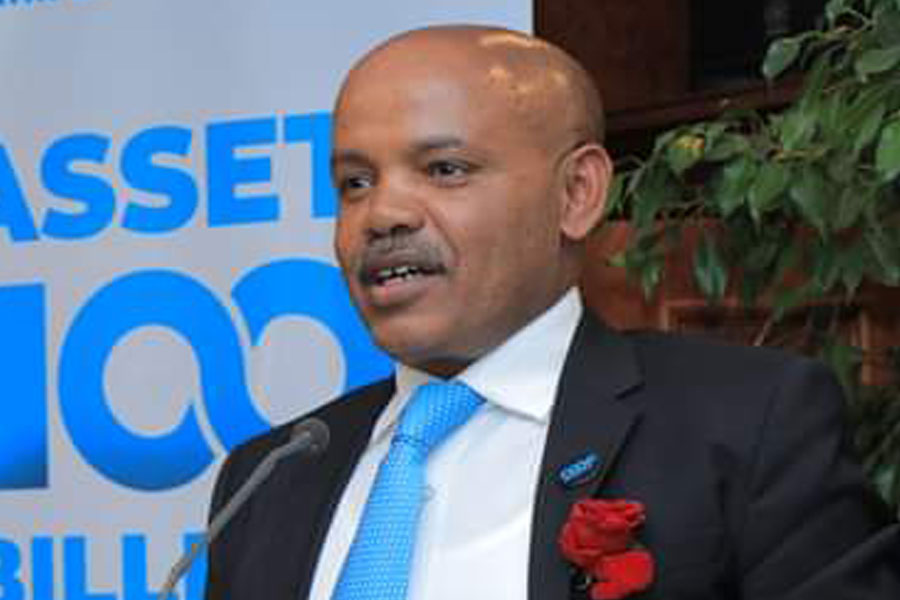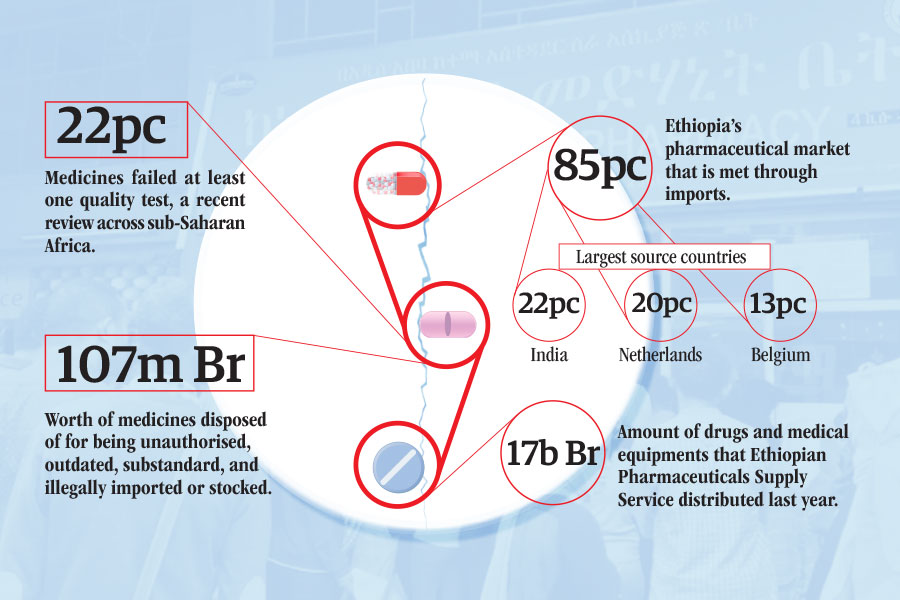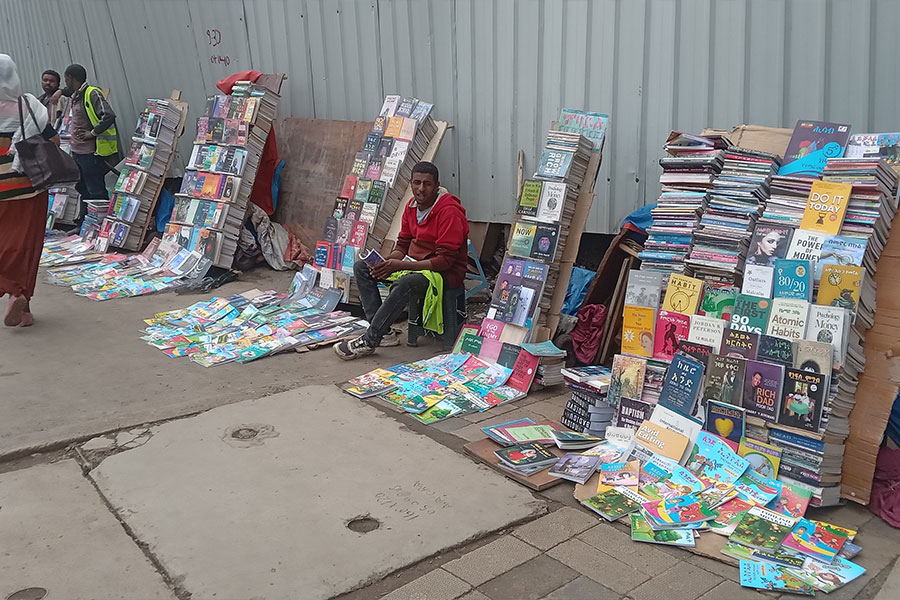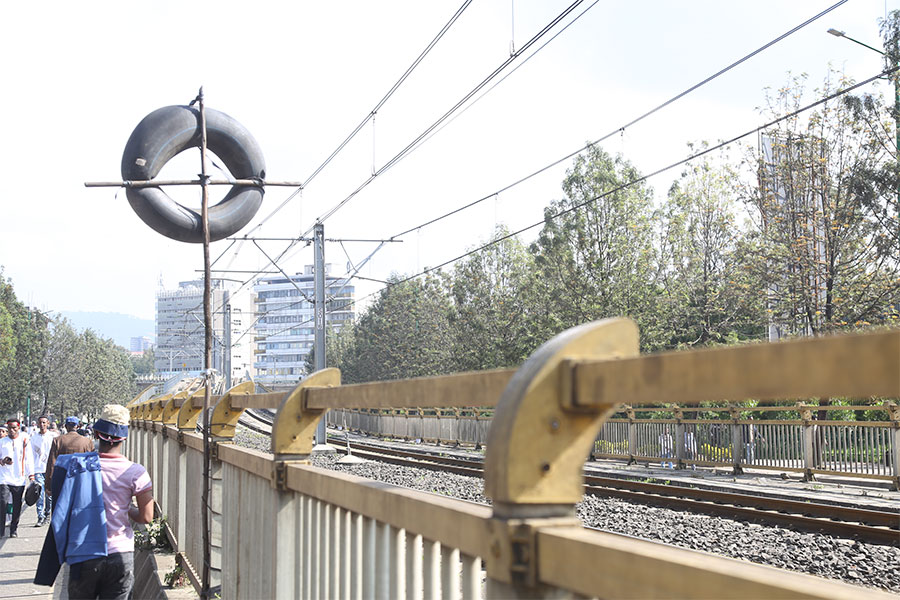
Federal authorities have embarked on an ambitious initiative, granting 17 domestic pharmaceutical manufacturers preferential access to a multi-billion Birr supply contract scheme. Part of a comprehensive 10-year plan unveiled last year by the Ministry of Finance, it targets the growth of local pharmaceutical production while curtailing the country's foreign currency expenditure on pharmaceutical procurements.
The preferential treatment is designed to respond to the chronic foreign currency scarcity that has long beleaguered the sector. The initiative is part of the Ethiopian Pharmaceutical Supply Services' (EPSS) strategy to provide local manufacturers up to 55pc of foreign currency payments for inputs.
According to Solomon Nigussie, the deputy head of EPSS, the dual objectives of the plan are boosting foreign exchange reserves and reviving the domestic pharmaceutical industry.
"The main goal here is to save dollars," he told Fortune.
By increasing the local manufacturers' share of EPSS's annual procurements from eight percent to an ambitious 25pc, the government wants to uplift the local industry's market presence. The initiative takes root in a broader context where Ethiopia, like many developing countries, wrestles with the problem of ensuring a steady and reliable supply of pharmaceuticals. The country's reliance on imported medical supplies has strained its foreign currency reserves and exposed it to supply chain vulnerabilities.
The authorities' shift towards empowering local production is seen as a strategic move to address these risks, ensuring a self-sufficient healthcare system.
The scheme has already seen the signing of agreements for two billion Birr worth of supplies, following a tender floated in September that covered 120 varieties of medicine, chemicals, reagents, and medical equipment. Despite a competitive selection process, only 20 suppliers, including three importers, qualified for 49 items valued at 3.9 billion Br. It is part of EPSS's larger procurement plan, which totalled 41 billion Br last year and is expected to reach nearly 46 billion Br this year, with a substantial portion of the supply coming from donations.
In a letter addressed to the Ministry of Health last week, Abdulqadir Jeljelo, head of the Service, sought cooperation to streamline operations for the 17 companies that secured contracts under the recent supply contract scheme.
EPSS, a state-owned enterprise established in 1947, has been at the forefront of exploring avenues to source products from domestic suppliers. Its efforts are now being supported by regulatory agencies, with the Public Procurement & Property Authority reviewing a proposal to initiate the procurement of 3.5 billion Br worth of medical supplies through restricted bids.
The former Minister of Health, Lia Tadesse (MD) engaged the American consulting firm, McKinsey & Company, to consult on a sustainable domestic supply chain. The firm's task was to chart a course for the sector to meet 60pc of the country's medical demand locally in the next five years.
The ambitious goal reflects a broader vision to reduce dependency on imports and encourage a robust local pharmaceutical industry capable of addressing the population's healthcare needs, says Firehiwot Abebe, the state minister for Health. She disclosed a decision to allow local manufacturers to settle a substantial portion of their foreign currency payments.
"It was clear that most have struggled with forex access," she told Fortune.
Extensive studies informed the policy change to identify domestic manufacturers' major hurdles, with access to foreign currency being a major challenge. In response, a directive was sent to the National Bank of Ethiopia (NBE), urging the prioritisation of pharmaceutical manufacturers in the allocation of foreign currency, with detailed estimates underway to ascertain the specific needs of each manufacturer.
The Armauer Hansen Research Institute (AHRI) plays a defining role in this process, analysing the supply dynamics and determining the foreign currency required by domestic manufacturers through an input-output coefficient ratio. According to its officials, this approach ensures that the support extended to the manufacturers is precisely calibrated to their operational needs.
The State Minister stressed the significance of achieving at least 40 pharmaceutical import substitutions, as one of the key pillars in the Ministry's objectives to meet in the coming years.
Despite this strategic push to enhance local production, the Pharmaceutical Manufacturers Association leaders stressed the implications of a thriving domestic manufacturing industry on jobs. With nearly 6,000 people employed across the sector, the expansion of domestic manufacturing is poised to create growing job opportunities, contributing to economic growth and skill development.
Daniel Waktole (PhD), the head of the Association and a major shareholder in Kilitch Estro Biotech Plc, voiced optimism about the new policy orientation.
He believes Kilitch Estro Biotech Plc has secured a direct contract to supply 522 million Br worth of supplies to EPSS.
"It's a case demonstrating the government's commitment to nurturing domestic production," he told Fortune.
The initiative is seen as a crucial incentive for boosting production capacities and addressing the operational challenges posed by the scarcity of foreign currency for importing essential inputs. With nearly half of the Association's 24 members benefiting from the new incentive offered by EPSS, Daniel is exploring ways to make prices more flexible. Despite these proactive measures, the road ahead for pharmaceutical manufacturers has drawbacks.
Many companies have faced operational disruptions over the past two years, primarily due to difficulties in securing foreign currency for imports. Huamanwell Pharmaceutical Ethiopia Plc, for instance, has been operating at a third of its capacity due to these constraints, although it has been in business for six years. Nevertheless, the recent policy shifts have rekindled hope among its managers, signalling a potential turnaround in their operational fortunes.
Fisseha Woldegiorgis, senior manager at the factory in Bulga, Amhara Regional State, renewed a sense of optimism after the company won a bid to supply 20 items worth 530 million Br.
"I hope they expand this type of incentive," Fisseha told Fortune.
Huamanwell has received support from its holding company in China to meet the factory's nearly 12 million dollars annual forex demand. Fisseha disclosed the importance of convincing the holding company about the long-term potential and viability of the market.
Yet, as the authorities tread towards self-reliance in pharmaceutical production, maintaining stringent quality standards cannot be overstated, says Getasew Amare, an economist.
"A robust regulatory supervision to ensure the push for local manufacturing does not compromise product quality is crucial," he told Fortune.
According to Getasew, high-quality standards are essential for winning public trust and the long-term viability and competitiveness of the domestic pharmaceutical industry.
"The responsibility for sustainable supply now lies with the manufacturers," he said.
PUBLISHED ON
[ VOL
, NO
]

Advertorials | Nov 15,2023

Fortune News | Apr 03,2023

Agenda | May 27,2023

Exclusive Interviews | Sep 07,2025

Fortune News | Aug 11,2024

In-Picture | Jul 06,2025

Addis Fortune | Jul 03,2025

Radar | Jan 16,2024

Radar | Oct 01,2022

Fortune News | Feb 14,2024

Dec 22 , 2024 . By TIZITA SHEWAFERAW
Charged with transforming colossal state-owned enterprises into modern and competitiv...

Aug 18 , 2024 . By AKSAH ITALO
Although predictable Yonas Zerihun's job in the ride-hailing service is not immune to...

Jul 28 , 2024 . By TIZITA SHEWAFERAW
Unhabitual, perhaps too many, Samuel Gebreyohannes, 38, used to occasionally enjoy a couple of beers at breakfast. However, he recently swit...

Jul 13 , 2024 . By AKSAH ITALO
Investors who rely on tractors, trucks, and field vehicles for commuting, transporting commodities, and f...

Nov 1 , 2025
The National Bank of Ethiopia (NBE) issued a statement two weeks ago that appeared to...

Oct 25 , 2025
The regulatory machinery is on overdrive. In only two years, no fewer than 35 new pro...

Oct 18 , 2025
The political establishment, notably the ruling party and its top brass, has become p...

Oct 11 , 2025
Ladislas Farago, a roving Associated Press (AP) correspondent, arrived in Ethiopia in...